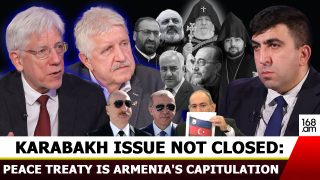
The Causes of the Third Karabakh War

Just when you think the war is over, it actually is not. Multi-generational families are haunted by the dead. There are too many displaced persons, multitudes of refugee children uprooted from schools and homes, and continued mistreatment of POWs. The major economic dislocations and massive war debts are part of the ongoing and mounting negative tally. The competing legal terms national self-determination vs territorial integrity are brandished about in fervent ideological battles that further entrench the hardened positions of two combatant sides.
The unexploded mines and munitions represent the obvious immediate physical dangers, but the continuing ethnic animosity, spilling over into simmering hatred, as recent war atrocities, crimes against humanity and cultural genocide are revealed, provide the requisite fuel for a possible future round of conflict. All elements seem to reinforce nationalist exhortations to significantly upgrade the military profile and readiness for the next, seemingly inevitable war, perhaps a mere few years from now.
The planners, calculating future military weapons technology, seek strategic revolutionary breakthroughs. The consequences of critical and secretive quests for advantage is inherently destabilizing. The 44-day drone war witnessed a dramatic technological breakthrough for Azerbaijan that rapidly overwhelmed the Armenian World War One-like approach of focusing on trench defences. In any future war, it is highly likely that the weaponry will be more stealthy, precision-guided and deadly than the drones proved to be in 2020.
Inevitably, the South Caucasus region will continue to be a magnet for major regional and global powers to be engaged. They seek to protect their perceived vital interests and enhance their geo-political ambitions. In 1914, the Balkan ‘powder keg’ fuelled the Great Powers’ rivalry in that region, and, in turn, led to the outbreak of World War One. The South Caucasus seems poised to be an equivalent catalyst in the 21st century. The 2020 drone war was perhaps only one painful episode in the long history of reoccurring wars in the region. Without a change in course, far worse seems likely in the future for the ethnically-diverse and conflict-prone mountainous lands. Finding our way through the rocky terrain remains an exceedingly complex and perilous task. Where are the brave individuals that can lead us towards reconciliation and thereby long-term peace and security? Instead, we seem to be fumbling towards another and more deadly war. Planning for a new arms race is already underway.
Alan Whitehorn is an emeritus professor of political science and writes on international relations and ethnic conflict. He has participated in several international workshops on the South Caucasus.
May 7, 2020























